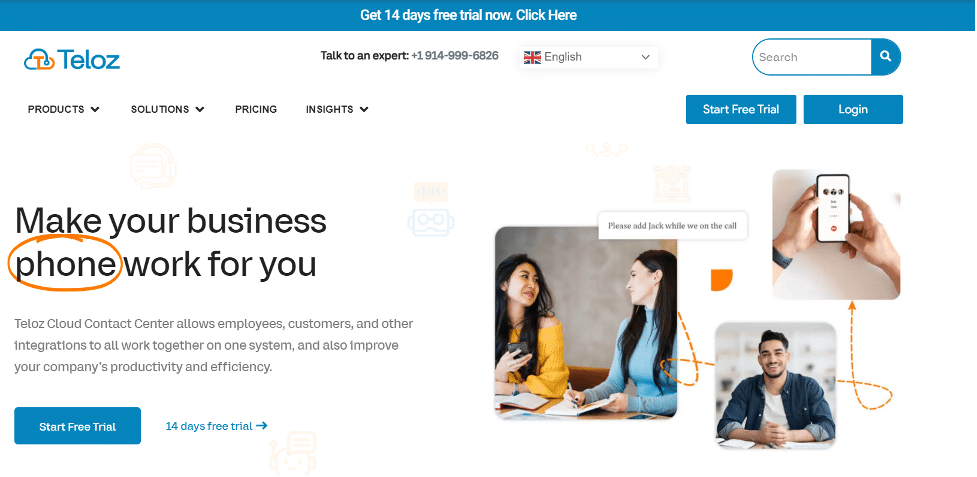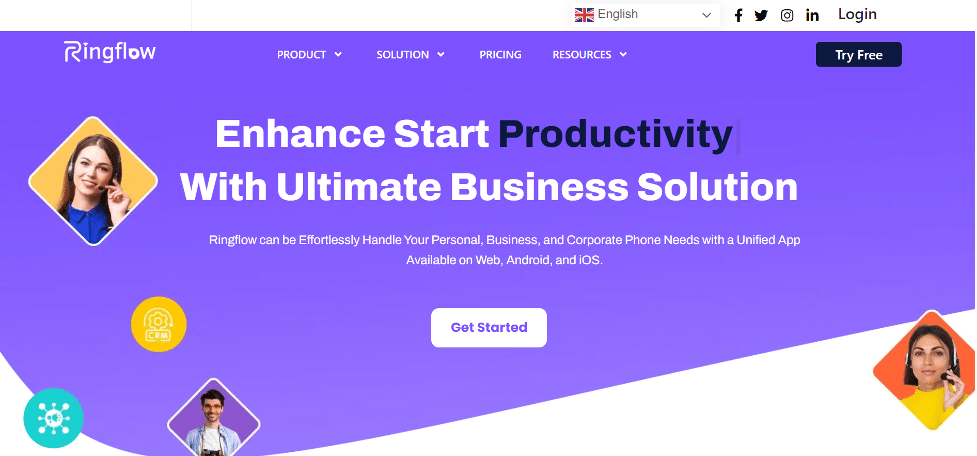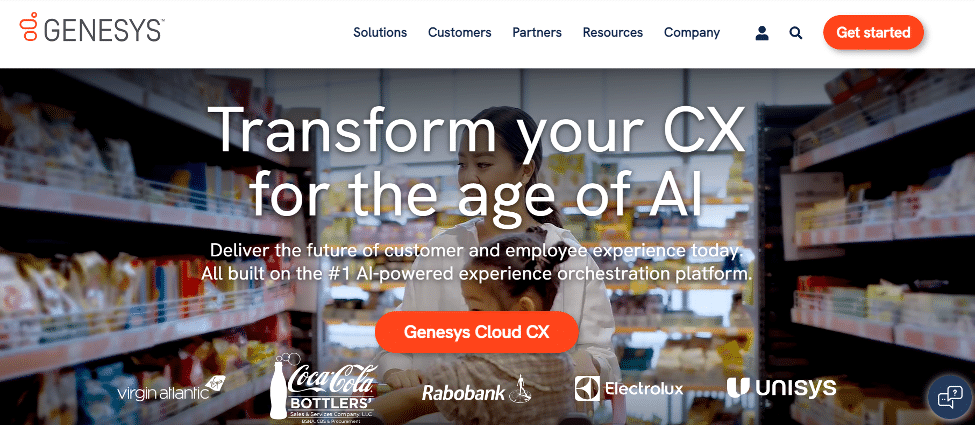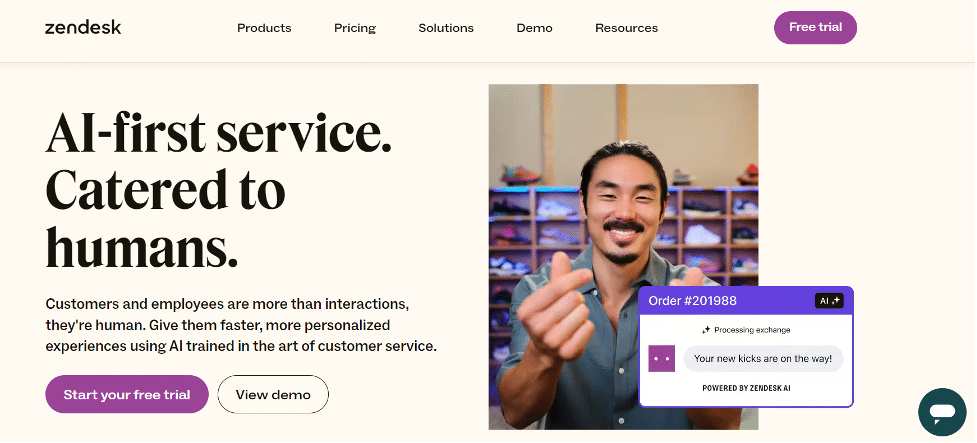In today’s digital age, businesses are constantly seeking innovative ways to enhance customer interactions and streamline operations. Cloud contact centers have emerged as a game-changing solution, offering unparalleled scalability, cost savings, and advanced features.
This article explores the benefits of cloud contact centers and spotlights five leading providers in the market. Discover how this technology can revolutionize your customer service operations and give your company a competitive edge.
What is a Cloud Contact Center?
A cloud contact center is a web-based software platform that manages customer interactions across various communication channels, offering businesses a wide range of features and benefits over traditional on-premise systems.
Cloud contact centers utilize remote servers for storing and processing data, which eliminates the need for businesses to invest in costly hardware and infrastructure. This allows companies to scale their operations more flexibly, depending on fluctuating demands and growth. Highly customizable and adaptable, these platforms offer advanced analytics tools that provide insights into customer behavior and preferences, enabling businesses to enhance their service quality and optimize their operational efficiency.
Why are Businesses Switching to Cloud Contact Centers?
Businesses are increasingly switching to cloud contact centers due to their scalability and flexibility, cost savings, advanced features such as AI integration, and the ability to provide an omnichannel customer experience that seamlessly integrates with CRM systems.
Scalability and Flexibility
One of the primary reasons businesses prefer cloud contact centers is their scalability and flexibility, allowing enterprises to easily adjust their capacity based on demand.
Cloud contact centers offer a range of technical features that enhance their scalability. For example, they utilize virtual environments that can quickly expand or contract to meet changing needs without the hassle of physical infrastructure adjustments.
Real-world applications of cloud contact centers are diverse, catering to enterprises of all sizes. Small businesses benefit from cost-effective solutions that grow with them, while large corporations appreciate the ability to scale operations globally with ease.
The integration of artificial intelligence and advanced analytics in cloud contact centers revolutionizes customer service. These technologies enable personalized interactions and predictive insights, enhancing customer satisfaction and operational efficiency.
Cost Savings
Cloud contact centers offer significant cost savings compared to traditional on-premise systems, as they eliminate the need for expensive hardware and maintenance.
One primary way cloud contact centers help in cost savings is through their flexible pricing models. These models often operate on a pay-as-you-go basis, allowing companies to scale their services based on actual usage, thereby avoiding unnecessary expenditures on unused capabilities. The reduction in upfront capital expenditures is another notable benefit. By moving to the cloud, businesses can avoid the hefty initial investments required for on-premise equipment and infrastructure.
Ongoing maintenance costs are significantly lower with cloud-based solutions. With providers handling the maintenance and updates remotely, companies can avoid the expenses associated with in-house IT teams and system upgrades. This streamlined approach not only reduces costs but also ensures that businesses have access to the latest technological innovations without additional expenditures.
Advanced Features
Cloud contact centers come equipped with advanced features such as AI-driven analytics, which provide deeper insights into customer interactions and help improve service quality.
These cutting-edge technologies enable cloud contact centers to offer personalized experiences through data-driven decision-making processes. Cloud solutions leverage real-time analytics to optimize agent performance and efficiency, leading to enhanced customer satisfaction levels. Cloud contact centers also boast scalability and flexibility, allowing businesses to easily adjust resources based on demand fluctuations. This adaptability ensures seamless operations without the need for major infrastructure investments, making cloud solutions a cost-effective and future-proof choice for modern organizations.
Remote Work Capabilities
With the shift towards remote work, cloud contact centers have become essential as they enable customer service representatives to handle customer interactions from anywhere.
This shift towards remote work has been accelerated by recent global events, making it imperative for businesses to adopt flexible and scalable solutions such as cloud contact centers. These centers offer a range of functionalities and features that support seamless communication and collaboration among distributed teams, ensuring the continuity of customer support operations regardless of physical location.
- One crucial advantage of cloud contact centers is their ability to provide real-time data analytics, allowing organizations to gain actionable insights into customer behavior and preferences.
- Cloud-based platforms offer omnichannel support, enabling agents to engage with customers across various communication channels, including phone, email, chat, and social media.
- Advanced technologies like artificial intelligence and machine learning are also integrated into cloud contact centers, enhancing efficiency and personalization in customer interactions.
What are the Top Cloud Contact Center Providers?
In the competitive landscape of cloud contact centers, top providers like Teloz, Ringflow, Five9, Genesys, and Zendesk Talk stand out due to their comprehensive features, seamless integrations, and robust customer support.
Teloz

Teloz offers a scalable cloud-based contact center solution with a focus on remote work capabilities. Their platform allows agents and supervisors to access the system from anywhere, on any device. Teloz boasts features like omnichannel support, automation tools, and robust reporting for businesses of all sizes.
Ringflow

A well-known name in cloud communications, RingFlow offers a comprehensive contact center solution with features like call routing, voicemail transcription, and integrations with popular CRM platforms. They cater towards businesses seeking a reliable and easy-to-use platform.
Five9

Five9 is a leading cloud contact center provider known for its robust features, including AI-driven automation and comprehensive analytics tools.
Businesses that choose Five9 benefit from a range of advanced capabilities that enhance customer interactions and streamline operations. With AI-driven automation, companies can efficiently handle customer inquiries, reducing wait times and improving overall customer satisfaction. The comprehensive analytics tools provided by Five9 offer valuable insights into call data and agent performance, enabling businesses to make data-driven decisions for better outcomes.
Genesys

Genesys stands out as a cloud contact center provider with its strong focus on AI integration and customer-centric solutions.
One of the key aspects that sets Genesys apart is its advanced AI integration capabilities. By leveraging cutting-edge technologies, Genesys allows businesses to automate processes, personalize customer interactions, and gain valuable insights from data.
Along with AI, Genesys excels in providing customer-focused features that enhance user experience and streamline communication channels. With customizable solutions tailored to meet individual business needs, organizations can easily adapt and scale as required.
The overall effectiveness of Genesys as a cloud contact center solution is evident in its ability to improve operational efficiency, drive customer satisfaction, and optimize workforce performance. Businesses that choose Genesys can benefit from a seamless and integrated platform that enhances overall productivity and delivers exceptional customer service.
Zendesk Talk

Zendesk Talk is a cloud contact center solution that seamlessly integrates with Zendesk’s CRM, offering businesses a unified platform for managing customer interactions.
By combining Zendesk Talk with its CRM platform, Zendesk provides companies with a powerful toolset to enhance customer service operations. The CRM integration allows agents to access customer information and interaction history directly from the contact center interface, enabling personalized and efficient interactions. This streamlines processes as agents do not have to switch between systems, leading to quicker issue resolution and improved customer satisfaction. The integration enables seamless data synchronization between the contact center and CRM, ensuring consistency and accuracy in customer records.
What are the Key Features of Each Provider?
Each cloud contact center provider offers a unique set of key features that cater to various business needs, from AI and analytics to CRM integration and omnichannel support.
Teloz
Teloz provides a cloud contact center solution with advanced analytics and robust features designed to enhance customer engagement.
One of the key features of Teloz is its powerful analytics capabilities, which allow businesses to gain deep insights into customer interactions and sentiment analysis. These analytics tools help organizations measure and track key performance indicators, enabling them to make data-driven decisions and improve operational efficiency.
Teloz offers real-time reporting and visualizations that enable managers to monitor live call metrics, agent performance, and overall contact center operations. This real-time data give the power tos businesses to respond quickly to changing customer needs and trends, ultimately leading to improved customer satisfaction and loyalty.
Ringflow
Ringflow offers a versatile cloud contact center platform with seamless integration options for various CRM systems.
By integrating Ringflow with popular CRM systems such as Salesforce, Zoho, and HubSpot, businesses can streamline their customer interactions and data management processes.
This synchronization allows agents to access customer information instantly during calls, enhancing personalized interactions and overall customer satisfaction.
The integration enables automated logging of interactions, saving time and effort for agents and ensuring accurate record-keeping for future reference.
Five9
Five9’s cloud contact center solution is packed with features like AI-driven automation and real-time analytics to help businesses enhance their customer service.
The AI-driven automation provided by Five9 give the power tos businesses to streamline their customer interactions, allowing for quicker response times and more personalized engagement. Leveraging this technology, companies can automate routine tasks, such as call routing and data entry, to free up agents for more complex inquiries, ultimately improving efficiency and customer satisfaction.
The real-time analytics tools of Five9 offer invaluable insights into customer behavior and call center performance. Through detailed reporting and predictive analytics, businesses can make data-driven decisions to optimize their operations, forecast customer needs, and identify areas for improvement.
By integrating these features into their contact center strategy, organizations can deliver exceptional customer experiences, increase productivity, and drive business growth.
Genesys
Genesys focuses on providing a customer-centric cloud contact center solution with features such as AI-powered interactions and comprehensive reporting tools.
Genesys revolutionizes businesses by offering a platform that not only facilitates seamless customer interactions but also significantly enhances operational efficiency. With its advanced AI-powered tools, the platform can intelligently route customer queries, predict customer needs, and personalize interactions. This level of automation not only streamlines processes but also ensures that customers receive prompt and relevant assistance.
Genesys’s comprehensive reporting tools provide businesses with valuable insights into customer behavior and preferences, enabling them to make data-driven decisions that lead to improved customer satisfaction and loyalty. By leveraging these features, businesses can create more personalized and meaningful interactions with their customers, ultimately driving growth and success.
Zendesk Talk
Zendesk Talk’s key features include seamless CRM integration, which allows businesses to manage all customer interactions from a single platform.
By integrating customer relationship management (CRM) functionalities, Zendesk Talk revolutionizes the way businesses handle customer interactions. This seamless integration enables agents to access customer data, purchase history, and preferences in real-time, providing personalized and efficient support. With all the crucial information readily available, agents can deliver more tailored responses, anticipate customer needs, and resolve issues promptly.
The CRM integration streamlines workflow processes, eliminating the need to switch between multiple tools. This consolidated approach enhances productivity, as agents can focus on addressing customer inquiries without the hassle of navigating different systems. Zendesk Talk’s CRM integration is a game-changer in customer service operations, boosting efficiency and customer satisfaction.
What are the Pricing Structures of Each Provider?
Understanding the pricing structures of cloud contact center providers like Teloz, Ringflow, Five9, Genesys, and Zendesk Talk is crucial for businesses to make informed decisions based on their budget and requirements.
Teloz
Teloz offers a flexible pricing structure for its cloud contact center solutions, tailored to meet the needs of different business sizes and requirements.
Teloz provides three main pricing plans: Basic, Pro, and Enterprise, each catering to specific business demands. The Basic plan, ideal for small businesses, includes essential features like call routing and basic reporting tools.
The Pro plan, designed for mid-sized companies, offers advanced features such as interactive voice response (IVR) customization and agent performance analytics.
For large enterprises, the Enterprise plan provides complete customization options, omnichannel support, and integrations with CRMs and other business tools.
Ringflow
Ringflow’s pricing structure is designed to offer scalability and flexibility, with various tiers that cater to small, medium, and large enterprises.
For small businesses, Ringflow provides a cost-effective entry-level package that includes essential features like basic communication tools and limited customization options.
Medium-sized companies have the opportunity to avail of a mid-tier plan that offers advanced functionalities such as analytics and integration capabilities, all at a competitive price point.
Larger enterprises can opt for the top-tier package, which boasts extensive customization, priority support, and enhanced security features, ensuring seamless operations at scale.
Five9
Five9 provides a range of pricing options for its cloud contact center solutions, designed to fit the needs of various business sizes and budgets.
One of the pricing options offered by Five9 is the Per Minute Plan, suitable for organizations with fluctuating call volumes. This plan charges customers based on the number of minutes used.
On the other hand, the Per Seat Plan is ideal for companies looking for a fixed per-agent pricing structure.
Five9 also offers a customizable Enterprise Plan for large corporations, providing advanced features such as omnichannel support, CRM integrations, and analytics tools.
Genesys
Genesys offers competitive pricing plans for its cloud contact center solutions, with different tiers to accommodate the specific needs of businesses.
One of the key pricing models provided by Genesys is the usage-based plan, which charges customers based on the volume of usage, such as the number of calls handled or messages processed. This model is ideal for businesses with fluctuating call volumes or seasonal peaks.
Genesys offers a subscription-based plan that provides a fixed monthly cost, allowing companies to budget effectively without unexpected spikes in expenditure. Both plans come with a range of features including advanced analytics, omnichannel support, and customizable routing options.
Zendesk Talk
Zendesk Talk’s pricing structure is designed to be straightforward and transparent, offering various plans that cater to different business needs.
Among the plans available, the most basic option is the Lite plan, which is great for small businesses and startups looking to establish their customer support system. It offers essential features such as email and social media integration at a budget-friendly price point.
Moving up, the Team plan provides a more comprehensive set of tools, including live chat and call recording functionalities, ideal for growing companies.
For larger enterprises with more complex requirements, the Professional plan offers advanced analytics and reporting features to optimize customer interactions.
The Enterprise plan is the top-tier offering with customizable options and priority support for mission-critical operations.
Conclusion
In conclusion, cloud contact centers offer a modern solution for businesses looking to enhance their customer interactions, providing a wide range of features, cost savings, and flexibility over traditional systems.
With the ability to scale resources as needed, businesses can ensure seamless customer service during peak times without the burden of maintaining on-premise infrastructure. Cloud contact centers enable remote work opportunities, allowing agents to work from anywhere, increasing workforce flexibility and potentially improving employee satisfaction. By choosing the right cloud contact center provider, organizations can leverage advanced analytics, AI-powered tools, and integrations with CRM systems to gain valuable insights and deliver personalized customer experiences.
Frequently Asked Questions
1. What is a cloud contact center and why should businesses consider it?
A cloud contact center is a customer service solution that is hosted in the cloud, rather than on servers onsite. This allows businesses to access all the necessary tools and features remotely, without the need for expensive hardware or dedicated IT resources. With the flexibility and scalability of the cloud, businesses can easily adapt to changing customer needs and improve their overall customer experience.
2. Who are the top 5 cloud contact center providers in the market currently?
The top 5 cloud contact center providers are 8×8, Genesys, Five9, NICE inContact, and Talkdesk. These providers have been consistently ranked highly for their advanced features, user-friendly interfaces, and reliable customer support.
3. What makes 8×8 stand out among other cloud contact center providers?
8×8 offers a comprehensive suite of communication and collaboration tools, including voice, video, chat, and contact center solutions. Their advanced analytics and AI capabilities help businesses gain valuable insights and improve their customer interactions. Additionally, 8×8 offers a global footprint and 99.99% uptime guarantee, making it a reliable choice for businesses of all sizes.
4. How does Genesys differentiate itself in the competitive cloud contact center market?
Genesys is known for its omni-channel capabilities, allowing businesses to seamlessly connect with customers across multiple channels, including voice, email, web chat, and social media. Their AI-powered technology also enables personalized and efficient customer interactions. In addition, Genesys offers a flexible deployment model, whether it’s on-premise, cloud, or hybrid, to suit the specific needs of each business.
5. Can businesses integrate their existing systems with cloud contact center providers like NICE inContact?
Yes, NICE inContact offers open APIs and integrations with popular CRM, collaboration, and workforce optimization tools, making it easy for businesses to connect their existing systems and streamline their operations. This also allows for a seamless flow of data and information between different platforms, improving efficiency and enhancing the customer experience.
6. How does Talkdesk cater to the needs of growing businesses?
Talkdesk’s cloud contact center solution is highly scalable and can easily accommodate the needs of growing businesses. It offers a user-friendly interface and a variety of customizable features, allowing businesses to adapt and scale their customer service operations as their business grows. Additionally, Talkdesk offers competitive pricing plans, making it a cost-effective option for businesses looking to scale their operations.
